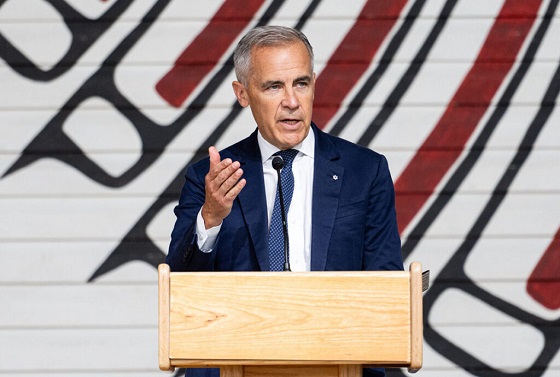Alberta
Loss of Brother to Addiction and Mental Illness Inspires Sister to Raise Money by Selling Face Masks.

Starting June 10th, until midnight Sunday, June 13th customers across Canada can help raise funds for Mental Health Organizations in their own provinces by purchasing much needed luxury cotton face masks.
Jodee Prouse, from Sylvan Lake, Alberta, co-owner of Service Mask Supply (SMS) is the provider of one of Canada’s best-selling luxury 3-layer Cotton Face Masks. She announced today that they will be donating $1.00 from every mask purchase on June 10, 11, 12 and 13th to Mental Illness Programs and Organizations in communities across Canada. “We all look forward to when we no longer need to wear face masks,” says Jodee, “and we are getting really close. I am proud that we can provide a much-needed product and at the same time allow others the opportunity to come together to raise money for Mental Health in their own communities.”
SMS is excited to announce that for 4 days this week, $1.00 from every mask will be donated to different Mental Health Organizations across Canada. Customers can place their order online, each mask is $5.00, and will ship directly to their homes or businesses. Jodee is proud of her team and orders quickly ship the next business day, leaving from their warehouse in Alberta. All monies collected will go back into each province to where the order was shipped. As an example, Alberta portion will go back to Canadian Mental Health Association Alberta Division, Manitoba to Rainbow Resource Centre and so on. This allows every Canadian the opportunity to make a difference and take part.
From the beginning, SMS had an amazingly simple business model, originally supplying schools and oilfield companies: provide comfortable and affordable masks (each is only $5.00) with patterns that make people smile. Smile. It is what Jodee and her business partner son Ryan believes we need more of right now during these unprecedented times. “My son and I, at different times in our lives, have both struggled with anxiety and depression. We lost a much-loved member of our family when our brother/uncle lost his battle with mental illness and alcoholism when he took his own life in March of 2012. He was only 39. This helped solidify our commitment to helping to eliminate the shame and stigma surrounding mental health.”
Now more than ever we want to bring communities together. And remind people they are not alone.

SMS is proud to be celebrating over 17,000 customers across Canada this week. They know that much of their success has been driven by their passionate customers, repeat business and recommendations to family, friends, and co-workers. “It fills my heart to receive not only Facebook messages and emails daily on how much they love our masks,” says Jodee, “but also the heartfelt words where strangers feel comfortable and safe enough to share some of their own mental health or addiction challenges.”
SMS has over 150 unique colors and patterns with such unique designs as sunflowers, flamingo’s, tie dye, dog lover, pretty kitties, fishing lures, butterflies, hearts, breast cancer, yoga, fine wine, pride, cupcakes and many more. Great for work, play, indoors and outdoors too with sizes for the whole family.
Learn more visit: www.servicemasksupply.ca
For more information you can email [email protected]
Alberta
When Teachers Say Your Child Has Nowhere Else to Go

When educators argue that children who don’t fit their system should have nowhere else to go, you’re witnessing institutional self-interest dressed up as social justice.
A petition is making its way through Alberta that could fundamentally reshape education in the province, and not for the better. The “Alberta Funds Public Schools” initiative, launched by Calgary high school teacher Alicia Taylor, asks a deceptively simple question: “Should the Government of Alberta end its current practice of allocating public funds to accredited independent (private) schools?”
Taylor isn’t just any teacher. She’s a Calgary district representative on the Alberta Teachers’ Association’s governing council. And while the ATA has been careful to maintain that this is Taylor’s personal initiative, they’ve conspicuously failed to repudiate it. In fact, ATA president Jason Schilling has publicly stated that members “take exception” to public dollars going to private schools, while simultaneously claiming the association’s policy isn’t “against private schools.” This is the kind of rhetorical contorsions that deserves scrutiny.
The timing is telling. The petition was approved just as 51,000 Alberta teachers launched the province’s first-ever province-wide strike. Taylor called this “a happy accident,” noting that striking teachers now have “a little more spare time than normal” to collect signatures. When your “personal initiative” coincidentally launches during a labor action and benefits from union members’ sudden availability, reasonable people might wonder how personal it really is.
To be fair, let’s present the strongest version of the argument Taylor and her supporters are making. They claim that Alberta spends the least per student in Canada on public education while funding private schools at 70%, the highest rate in the country. This creates what they see as a perverse incentive structure: public money flowing to selective institutions while universal public schools struggle with overcrowding and teacher shortages.
The math seems straightforward: $461 million currently goes to independent schools serving about 50,000 students. Redirect that money to the public system serving over 600,000 students, and you could fund thousands of teachers and educational assistants. You could reduce class sizes. You could provide more support for struggling students.
They argue this is about fairness and democratic accountability. Taxpayers fund education for the common good, and that investment should go to schools that must accept every student, not selective alternatives that can charge tuition on top of public subsidies. Private schools exist and thrive in Ontario without public funding. Why should Alberta be different?
Moreover, they contend, the current system subsidizes exit from the public system, creating a vicious cycle where families with resources opt out, taking their advocacy and engagement with them, leaving behind an increasingly residualized public system serving the most vulnerable students.
Underlying much of this argument is a class-based resentment: the notion that some families can access alternatives amounts to unfair privilege. This framing reveals more about the advocates than about education policy. Envy is never a good look in educators. When teachers’ unions frame educational choice as a problem because some families have options others don’t, they’re not arguing for equity. They’re arguing for enforced equality of limitation, where if not everyone can have something, no one should.
It sounds compelling. It’s also dangerously wrong.
Let’s start with the most fundamental flaw in this argument: taking the money doesn’t make the students disappear. Nearly 50,000 students attend independent schools in Alberta, plus another 8,000 in private early childhood programs. These children don’t vanish if funding is eliminated. They flood into a public system that petition supporters themselves admit is already overcrowded. The math is straightforward: forcing these students back into public schools would cost taxpayers an additional $300 million, more than the government’s most recent settlement offer to teachers. This is about forcing conformity at massive cost, while improving nothing.
But the financial argument, while important, pales beside the human cost. Consider what this petition really proposes: eliminating educational options for approximately 80% of independent school families whose income is at or below the provincial average. These aren’t wealthy elites. They’re middle-income families making sacrifices to access education that works for their children.
The class warfare rhetoric of the petition obscures this reality. When advocates frame school choice as privilege, they ignore that Alberta’s funding model specifically makes choice accessible to families who couldn’t otherwise afford it. Eliminating this doesn’t level the playing field. It simply ensures that only the truly wealthy retain educational options.
Here’s what makes this proposal particularly egregious: its devastating impact on neurodiverse learners. Many of the fastest-growing independent schools in Alberta serve students with special learning needs. These are children who struggled, or failed, in standard public school classrooms. They’re students with ADHD who need smaller classes and more movement. They’re autistic students who thrive with structured routines and specialized approaches. They’re kids with dyslexia who need intensive, systematic literacy intervention that their public school couldn’t provide.
The petition’s supporters blithely suggest these students should return to the very system that couldn’t serve them. When teachers are striking over classroom complexity and overcrowding, the proposed solution is to add tens of thousands more students, many with intensive needs, to those same classrooms. This is illogical and cruel.
The ATA argues that a “well-funded public system should be meeting the needs of those kids in the first place.” Should. That’s doing a lot of work in that sentence. Yes, the public system *should* meet every child’s needs. But it doesn’t. And there’s no evidence that simply throwing more money at the problem will change that.
Whatever challenges Alberta’s public schools face, it’s naive and simplistic to believe more money will fix them. There is no study in the world that connects higher teacher wages with better educational outcomes. The problems in public education are complex, structural, and often resistant to solutions that amount to “spend more.”
Neurodiverse students aren’t one-size-fits-all. A student who thrives in a Montessori environment with hands-on learning and self-directed exploration might struggle in a traditional classroom. A student who needs the structure and explicit instruction of a classical education might flounder with inquiry-based learning. An autistic student might do brilliantly in a small school with consistent routines and sensory-aware design, but melt down daily in a crowded comprehensive school.
Eliminating funding for independent schools eliminates options, period. It tells families: your child must fit into our system, or fail. For neurodiverse learners, this is often a sentence to years of struggle, frustration, and educational failure.
But this goes beyond neurodiversity. It’s about every kind of educational diversity. Alberta’s independent schools include French immersion programs, Indigenous-focused schools, classical academies, arts-intensive programs, schools with specific pedagogical approaches, faith-based education reflecting diverse religious traditions, and schools serving new Canadian communities with specific cultural and linguistic needs.
This is educational pluralism: the recognition that in a diverse democracy, different families have different values, different children have different needs, and no single approach serves everyone well. The ATA’s position, however much they try to obscure it, is that this diversity is a problem to be solved. That public money should only support one kind of school: the government-run, union-staffed, standardized public school. Every other option should be available. if at all, only to families wealthy enough to afford full-freight tuition.
This entrenches inequality rather than reducing it. Right now, Alberta’s funding model democratizes choice. A middle-income family whose child isn’t thriving in public school has options. Eliminate public funding, and those options exist only for the wealthy. The result is a rigid two-tier system where the rich can escape and everyone else is trapped.
The envious framing of the ATA’s position becomes clearer here. They see that some families can access alternatives and conclude the problem is the alternatives, not the lack of universal access. This is the logic of enforced mediocrity: if we can’t give everyone excellent options, we’ll eliminate the excellent options that exist. It’s a race to the bottom masquerading as equity.
Let’s be honest about what’s really happening here. The ATA represents teachers in public schools. It has no role in independent schools. Every student in an independent school is a student in a classroom where the union has no power, no collective bargaining rights, and no ability to call strikes that disrupt families.
When Taylor notes that families with children in independent schools experienced “business as usual” during the strike while public school families scrambled for childcare, she’s unwittingly making the case against her own position. Educational diversity means resilience. It means not every family is held hostage to a single system’s labor disputes.
The union has an institutional interest in maximizing enrollment in schools where it holds power. This petition advances that interest. That’s no coincidence. The careful distance the ATA maintains (“It’s not our petition, but we agree with its goals”) is transparent political cover.
Here’s the assumption underlying this entire petition: if we eliminate alternatives and force all students into the public system, somehow that system will improve. This is supremely naive. Suppressing educational variety and choice won’t improve the ails of the public system. It will simply trap more students in whatever problems already exist. If public schools are struggling with classroom management, adding students who left won’t help. If they’re struggling with diverse learning needs, adding students with intensive special needs won’t help. If they’re struggling with overcrowding, adding 50,000 more students certainly won’t help.
The theory seems to be that if we eliminate choice, the system will be forced to improve to meet everyone’s needs. But that’s not how monopolies work. When you have captive customers with no alternatives, the pressure to improve actually decreases. Competition, choice, and the possibility of exit are what create pressure for systems to innovate and serve their clients well.
Educational diversity makes everyone better off. It provides options for students who struggle in traditional settings. It allows innovation and experimentation. It respects that families have different values and priorities. It creates competitive pressure that benefits all schools. And it even costs taxpayers less because families contribute tuition on top of partial public funding.
The Taylor petition claims to be about fairness and adequate resources. In reality, it’s about control and conformity. It would devastate neurodiverse learners, reduce educational variety, eliminate options for middle-income families, and force tens of thousands of students into an already overcrowded system, all while costing taxpayers hundreds of millions more.
And for what? The promise that somehow, magically, removing alternatives will make the remaining system better? That’s wishful thinking dressed up as education policy.
The ATA may not have officially endorsed this petition, but they haven’t repudiated it either. Their silence is instructing, considering that no one would benefit most from the success of such petition than the ATA. And Alberta families, especially those with children who learn differently, should pay attention to what that silence means for their future choices.
When Taylor launched this petition as a “Calgary district representative on the Alberta Teachers’ Association’s governing council,” whatever the pretense of privacy, she wasn’t acting in a vacuum. When the ATA president publicly supports the petition’s goals while maintaining plausible deniability about its origin, that’s a political strategy. When striking teachers use their “spare time” to collect signatures for a petition that would eliminate non-union schools, that’s campaign coordination.
The envious rhetoric about “privilege” and “fairness” obscures what this petition does. It doesn’t help struggling students. It doesn’t improve public education. It doesn’t create equity. It eliminates options for middle-income families. It’s the worst kind of class politics: making everyone worse off in the name of equality.
Educational diversity is a necessity for a functioning pluralistic society. It’s essential for neurodiverse learners who don’t fit the standard mold. It’s crucial for families who want education that reflects their values. And it’s fundamental to the idea that parents, not government bureaucrats or union officials, should have the primary say in their children’s education.
Any proposal to eliminate educational diversity, whatever its rhetorical packaging, deserves to fail. And Albertans should see this petition for what it truly is: an institutional power play to eliminate competition and force conformity, motivated more by envy than by any genuine concern for educational outcomes.
The stakes are high. Educational freedom, once lost, is extraordinarily difficult to regain. When educators tell you that children who don’t fit their system should have nowhere else to go, believe them. Then fight back. Alberta families should resist this petition with everything they have.
For the full experience, and to help us bring you more quality research and commentary,
please upgrade your subscription.
Alberta
Mark Carney Has Failed to Make Use of the Powerful Tools at His Disposal to Get Oil Pipelines Built

From Energy Now
By Jim Warren
It can be refreshing when politicians clearly and unequivocally state their positions on important public issues. That’s what former BC premier, John Horgan, did during the 2017 BC provincial election campaign.
Horgan forthrightly announced he would use “every tool in the tool box” to stop the Trans Mountain pipeline expansion (TMX). For the next three years, Horgan stayed true to his word. Enthusiasm for the fight waned somewhat in July of 2020 when the Supreme Court foreclosed on any further delays over things like a lack of consultations with First Nations.
Of course, how one feels about frank and honest statements by politicians can depend on who is losing out. It can be less refreshing when every tool available is being employed in service of a measure you oppose. But, you at least have a better idea about what you are up against when your opponent clearly spells out where he stands.
The tool box has not been used much in support of pipelines
At this point in Mark Carney’s first year as prime minister it’s become rather obvious, he rarely employs any of the tools at his disposal in support of new oil pipelines. One might reasonably conclude that the opposite is the case—the vast powers of the Prime Minister’s Office (PMO) and the Government of Canada have been employed in opposition to any new oil pipelines to any Canadian coast.
The Liberal government has tried and failed to sell supporters of the oil industry on the idea that Bill-C5, The Building Canada Act, has paved the way for a new pipeline to Canadian tidewater. The prime minister knows Bill C-5 won’t do that.
Ninety some CEOs from Canada’s oil and pipeline sector have informed the PM that Bill C-5 by itself will do nothing to get a pipeline to any coast. They have sent letters saying this to Carney on three separate occasions since he became prime minister. One point repeatedly stressed by the CEOs as well as the Government of Alberta is that it is not possible to build a pipeline from Alberta to the West coast without the repeal of, or significant amendments to, the West Coast Tanker Ban, Bill C-48, and the Impact Assessment Act, formerly Bill C-69 (aka the No More Pipelines Bill).
Carney’s failure to address those concerns defies logic and common sense. The approval and completion of an oil pipeline from Alberta to Prince Rupert under Bill C-5, is in direct conflict with the tanker ban and would face virtually the same insurmountable barriers the Impact Assessment Act presented for previously cancelled pipeline projects. It is not logically possible for all three things to be true at the same time (i.e. Bills C-48 and C-69 remain in place and a pipeline to Prince Rupert is completed)
What possible harm could arise if the prime minister simply stated something to the effect that the boundaries of the region where oil tankers are banned under C-48 will be adjusted to accommodate pipeline projects approved under Bill C-5? You wouldn’t think saying so would remove any hide from Carney’s butt and would provide greater assurance to prospective pipeline proponents.
Wrong.
Carney will not say anything of the sort. That’s because he is more concerned about staying on the good side of the environmental activists who are among his most fervent supporters. The environmental groups leading the crusade against climate change, climate alarmed members of Carney’s caucus, and cabinet would just as soon see the tanker ban remain in place. They want Bill C-48 to serve as a trip wire to thwart projects like a revived Northern Gateway project. They would similarly balk at any tinkering with the Impact Assessment Act which might facilitate the approval and completion of such a pipeline.
Follow the money
Just follow the money. Here’s one of the many pieces of evidence we might consider. Mark Carney has been shoring up his support among anti-oil environmentalists with government cash. Among the un-budgeted expenditures announced by the government in early 2025 was the $206 million to be spent over the next five years under the auspices of the Climate Action Awareness Fund (CAAF). The funds will be used to combat the declining urgency among Canadians for combating climate change. The initial tranche of $14.4 million issued so far this year will be available to help young Canadians address climate change. It appears the principal delivery agents for CAAF funded projects will be environmental organizations, including those groups who were active in the infamous anti-Alberta oil campaigns.
In other words anti-oil environmental groups stand to be among the beneficiaries of $41.2 million per year in government largesse. This level of support is far more generous than the roughly $16.5 million, per year, Alberta’s Allan Commission reported Justin Trudeau’s government had been lavishing on anti-oil environmental groups.
No doubt the Liberals will claim the millions in CAAF funding is a wise investment as opposed to what it really is—an expensive perk for the government’s green supporters. It makes sense to expect the efforts of some of the groups being funded will be devoted to handcuffing the oil industry.
The tool box is actually wide open. It’s just not being used in support of increasing Canadian oil production, exports and revenues.
The tool box is far from empty
The bully pulpit available to the prime minister’s office (PMO) may indeed be far less influential than the one available to a US president. Nevertheless, a clear and unequivocal statement by the nation’s prime minister in support of building a new pipeline to the coast, under reasonable approval requirements, would go a long way toward encouraging potential proponents and reducing public angst and anger in the oil producing provinces.
Canada’s prime ministers have near Trumpian powers at their disposal should they choose to use them. The Justin Trudeau Liberals used the heavy hand of the Emergencies Act to stifle horn honking in Ottawa. Sure, the courts said using the Act in that instance was an overreach on the part of the government, but nobody in government was penalized for imposing it.
If the Emergencies Act isn’t enough to bulldoze a pipeline through to the coast the government can dust off the “peace, order and good government,” powers assigned to Ottawa under Section 91 of the Constitution. And let’s not forget the notwithstanding clause—available to stifle spurious lawsuits claiming that a pipeline is offending someone’s rights.
Admittedly, making use of those two options sounds pretty silly. However, it was Carney himself who suggested he was prepared to do something along these lines on one of the two or three occasions when he slipped up and gave people the impression he would back a pipeline. When campaigning in Kelowna last winter the prime minister said he would use all the powers available to the federal government to get one built. Since then he has backtracked, given Quebec a veto over pipelines to the East coast, and indicated any effort to get a new pipeline approved would require a national consensus and be subject to legislation and regulatory checks that would be extremely difficult if not impossible to meet.
Mark Carney is no John Horgan
Clearly, Mark Carney is no John Horgan. Our prime minister continues to dissemble, obfuscate and change the subject when it comes to getting behind a pipeline that would represent the most economically significant, nation building project capable of producing huge revenues within a relatively short period of time.
The recent federal budget did little to increase the possibility of getting a new export pipeline anytime soon. The conventional energy sector has been facing government barriers to growth in investments, production and exports for over a decade now. It is true the budget announced the elimination of one of those growth killing measures, the emissions cap. And the Liberals deigned to return free speech to those who support oil and gas. Saying something positive about conventional energy firms’ efforts on behalf of environmental sustainability will cease to be deemed illegal greenwashing. However, those positive changes still leave several other equally harmful policies in place.
The budget anticipates a huge increase in private sector investment in response to a package of uninspiring policy tweaks and sugar-coated forecasts. There is little, if anything, in the budget to justify its excessively optimistic predictions. On the other hand, the budget announced that carbon capture projects will not count toward emissions reduction credits if the CO2 will be used for enhanced oil recovery. This will be a bane to CO2 capture efforts in the oil sands and potentially gives the federal government another reason to stifle growth in production and exports.
The flight of investment during the Liberal years owes much to the lack of confidence generated by policies like Bills C-48 and C-69. Doing something to limit the investment killing effects of those two pieces of legislation would cost relatively little, generate billions in oil export revenue, and help restore investor confidence.
If Carney has actually decided there will be no new oil pipeline to the West coast, at some point in the near future that reality will catch up with him. Remaining elusive about pipelines today may help the Liberals should there be a snap election. But, it will do little to advance national unity and is likely to boost the independence vote in Alberta’s referendum.
Here we go again. On Friday November 7 the prime minister told attendees at Canadian Club event in Toronto not to worry the long sought pipeline “was going to happen.”
Pardon me if I’m not convinced. Over the previous three months the liberals clearly acted as though becoming an energy super power could happen without increasing oil production and exports.
-

 Business2 days ago
Business2 days agoLiberals refuse to disclose the amount of taxpayer dollars headed to LGBT projects in foreign countries
-

 Alberta2 days ago
Alberta2 days agoSchool defunding petition in Alberta is a warning to parents
-

 Daily Caller1 day ago
Daily Caller1 day agoUS Nuclear Bomber Fleet Shares Fence With Trailer Park Linked To Chinese Intel-Tied Fraudster
-

 Digital ID2 days ago
Digital ID2 days agoCanada moves forward with digital identification for federal benefits seekers
-

 espionage1 day ago
espionage1 day agoChinese-Owned Trailer Park Beside U.S. Stealth Bomber Base Linked to Alleged Vancouver Repression Case
-

 Daily Caller1 day ago
Daily Caller1 day agoLaura Ingraham Presses Trump On Allowing Flood Of Chinese Students Into US
-

 COVID-191 day ago
COVID-191 day agoSpy Agencies Cozied Up To Wuhan Virologist Before Lying About Pandemic
-

 MAiD12 hours ago
MAiD12 hours agoQuebec has the highest euthanasia rate in the world at 7.4% of total deaths












